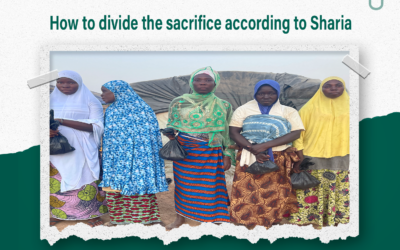The importance of giving Zakat
Giving zakat is an important act of faith in Islam, as it achieves social justice and promotes economic balance in society. By offering Zakat, Muslims can alleviate poverty and enhance the blessing in their lives and the lives of others.
The importance of Zakat in Islam
Zakat is one of the fundamental pillars in Islam, as it aims to achieve social justice and solidarity among members of society. The provision of Zakat contributes to alleviating poverty, providing decent life opportunities for the needy and vulnerable, and enhancing the economic balance in society. It is also considered a worship that brings a Muslim closer to Allah and increases the attainment of divine blessing and satisfaction in his life. Therefore, giving zakat is an important duty for a Muslim to achieve social justice and deepen the spirit of responsibility and solidarity in the Islamic Society.
Benefits of giving Zakat
Giving zakat is important for Muslims, as in addition to achieving social justice and providing a decent life for those in need, there are many other benefits of giving Zakat. Zakat may increase the blessing and divine satisfaction in the life of a Muslim, strengthen social ties and deepen the principle of solidarity and cooperation in Islamic Society.
Persons entitled to zakat
People who are entitled to zakat are the poor and needy in the Islamic community, and they are considered one of the most important categories for which zakat is directed to them, as it is provided to contribute to promoting social justice and achieving solidarity and solidarity among members of the Muslim community. Zakat is used to meet their basic needs such as food, clothing, housing and treatment. According to Islamic law, a specific percentage of personal wealth that must be distributed in the form of Zakat is determined according to specific rules and conditions.
To whom zakat is given
Poor and needy Zakat expiation
The poor and needy are the main category that benefits from zakat. Zakat is directed to them to meet their basic needs such as food, clothing, housing and treatment. Zakat is considered a social duty that contributes to strengthening the rules of society and achieving solidarity and solidarity among its members.
Who are the people who are entitled to zakat in the Islamic community
People who are entitled to zakat in the Islamic community are the poor and needy who do not have enough to meet their basic needs. Giving Zakat to these people is an Islamic duty to strengthen the solidarity of society and achieve social justice.
How to give Zakat
The provision of Zakat is through the payment of the eligible amount of Zakat to the beneficiaries, and it can also be distributed through accredited charities and specialized Islamic institutions, ensuring that it reaches those who need it effectively and systematically.
The amount eligible for Zakat
The eligible amount of Zakat is money that exceeds the statutory limit or the established minimum amount of Zakat. This amount is calculated based on the value of funds and assets that a person owns at the end of the Hijri year. The amount that a person has should be more than the basic needs of his life and family so that he has the ability to provide money to the poor and needy.
The best ways to distribute Zakat and donate to AHAD Association
Zakat should be distributed to the poor and needy in the best possible and effective ways. The cooperation of trusted Islamic charities and institutions is preferred to ensure that Zakat reaches the deserving people fairly and effectively. Schedules, waiting lists and case assessment can be used to prioritize and ensure fair distribution and fairness in the provision of Zakat and this is what AHAD does.
Benefits of Zakat
The benefits of giving Zakat include achieving economic and social balance in society, increasing the blessing in money and life after giving Zakat. Giving Zakat strengthens social ties and contributes to building society in a positive and effective way.
To whom zakaah is given
To whom zakaah is given
Economic and social balance
The provision and distribution of Zakat in a fair and equitable manner is one of the factors contributing to the achievement of economic and social balance in society. Thanks to zakat, wealth is directed towards the poor and needy, which promotes justice and equality in society and reduces poverty and economic injustice. In addition, individuals who are eligible for Zakat are able to receive the necessary support to improve their living conditions and provide basic needs for them and their families. Thus, an economic and social balance is achieved that generalizes prosperity and stability to everyone in society.
Blessing money and life after giving Zakat
Giving alms brings blessing in money and life, as God multiplies wealth and grace to the person who bestows alms with alms. Muslims believe that Zakat brings sustenance and protects money from loss, and also promotes satisfaction and contentment with what an individual possesses and provides him with happiness and psychological comfort. In addition, giving Zakat believes that the money left after paying Zakat will be more blessed and blessed in its use and investment, enabling a person to achieve success and prosperity in his financial and personal life.
The impact of Zakat on society
Zakat leaves a positive impact on society, as it contributes to the achievement of social justice and reduces poverty and need. It also strengthens social ties and contributes to building a cohesive and cooperative society. The equitable distribution of Zakat encourages individuals to provide assistance and promotes the spirit of participation and solidarity among individuals in society.
The role of Zakat in achieving social justice
Zakat plays an important role in achieving social justice in society. By distributing money and wealth appropriately, Zakat works to reduce economic and social disparities and distribute wealth among individuals in a fair way. Zakat is directed to the poor and needy to improve their material conditions and their lives in general, which promotes justice and solidarity in society.
Contributing to the building of society through Zakat
Zakat contributes to building society significantly by achieving social justice and providing financial support to the poor and needy. By directing Zakat to this segment of society, he gives them the opportunity to grow, develop and contribute to the economic and social development of society in general.
Conclusion
Giving zakat is an important Islamic obligation that benefits the entire society. It promotes social justice, builds strong bonds between members of society, contributes to improving the lives of the poor and needy.
The importance of Zakat in strengthening social ties
Zakat plays an important role in strengthening social ties in society. When individuals take out Zakat and distribute it to the poor and needy, empathy and compassion are strengthened among members of society. Zakat strengthens social ties between individuals, spreads compassion and charity in society, promotes social justice and strengthens social cohesion. Thus, giving zakat is one of the effective methods to strengthen social ties and achieve balance in society.
You can visit the ahad Association website to find out more about the projects it offers
Related articles:
Social and economic benefits of Zakat
Join us in our message by donating
Donate now




